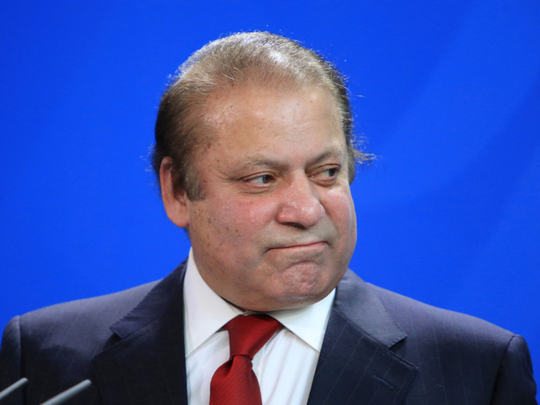
Pakistan’s opposition leader Imran Khan’s promise to lead his political cadres in laying a siege of Islamabad on October 30 deserves to be seen as a sign of the country going increasingly adrift. At the centre of Imran’s push is a demand for Prime Minister Nawaz Sharif to step down and allow an independent investigation into the billions of dollars of overseas wealth belonging to his three children.
The demand is a fair expectation from any leader, notably a democratically elected one, to come clean on unaccounted wealth that remained hidden from public eye until it was revealed in the so-called Panama leaks. The issue is not just about Sharif’s children owning offshore wealth — which is allowed under Pakistan’s law, provided it has followed legal norms for offshore assets. The issue is centrally about how this wealth was earned in the first place and the findings becoming an ultimate pointer towards the integrity of Sharif and his close family members.
The objective behind Imran’s latest initiative, however, is far from clear. He has been agitating for a long time without making a dent in Sharif’s ruling structure. Almost two years ago, Imran had led a number of protesters who camped outside the parliament in central Islamabad as part of a ‘dharna’ (squatting), which lasted for months. Ultimately, the protest ended after a vicious Taliban terrorist attack on a school in Peshawar in December 2014, in which more than 140 innocent children lost their lives.
But rather than consider the likely success or otherwise of Imran’s planned agitation, a more relevant exercise for the future of Pakistan will be to consider Sharif’s ability to stay on course in the face of mounting challenges. To begin with, Sharif’s tenure, which saw him become Prime Minister for the third time in his career in 2013, has been marred by contradictions.
While Pakistan’s rural dwellers have badly suffered in the wake of possibly the worst agricultural crisis ever to hit the country, Sharif and his coterie of political leaders and followers have relentlessly pursued high-profile and fanciful infrastructure projects. In a country where up to 60 per cent of the population lives in rural areas, the impact of the agricultural downturn must be very obvious. The writing on the wall is indeed clear: Farmers have been badly neglected in pursuit of grandiose projects such as air-conditioned bus services and highways.
Meanwhile, the largest-ever planned foreign investment in Pakistan’s history has come in the shape of China’s initiative to invest more than $51 billion (Dh187.57 billion) to link its western regions to the Gwadar port in southern Pakistan, through highways, oil and gas pipelines, train links and electricity generation projects. Though a game changer for the future of Pakistan, the plan is now in danger of running into uncertainty amid criticism from Sharif’s opponents, who see an increasing determination by Islamabad’s rulers to shift the key components of this plan to Punjab — Sharif’s home province and the source of his political strength. As Sharif apparently seeks to shore up his popularity on his provincial turf, the larger national interest of Pakistan has been neglected.
On the face of it, there is little that Sharif or his ruling structure have begun doing to narrow the political divide on this key initiative. Without deft political handling and unusual generosity to accommodate all of Pakistan’s provinces, Sharif runs the risk of further aggravating the country’s growing internal divisions.
Meanwhile, Pakistan remains locked in an ongoing crisis in relations with neighbouring India over recent events in Kashmir. It would be unwise for any Indian or Pakistani leader to assume that an all-out war involving nuclear weapons can be fought and won. But beyond the lack of maturity in both countries for solving chronic disputes, each suffers from handicaps inherent to the characters of their leaders.
In Sharif’s case, the failure to appoint a full-time foreign minister has ultimately meant that there is no single focal point in the daily conduct of Pakistan’s foreign policy. At the moment, there are two full-time advisers running the Foreign Ministry — and reportedly working at cross purposes at times — while the Prime Minister’s Office is the third tier of authority that gets involved in foreign policy issues whenever needed.
This three-tiered foreign policy establishment has only created the impression of a failure at the top in successfully tackling what is indeed a challenging responsibility. Barring a small slice of its border with China, Pakistan faces varying degrees of challenges with all its other neighbours — notably India, Afghanistan and to some extent Iran.
There are also important relationships with more distant foreign policy partners in need of active management, notably the US, the European Union, Russia, Saudi Arabia and the UAE. There are either sizeable Pakistani communities and/or other important bilateral interests that bind Islamabad to each of these important players.
What Imran is pushing for is just one of the many facets of Sharif’s rule — revelations through the ‘Panama leaks’. However, it’s important to consider an entire array of issues under Sharif that remain unaddressed as Pakistan remains visibly rudderless.
Ironically, occasions when Sharif has turned up in the parliament are too few. Meanwhile, a paucity of cabinet meetings has only reinforced the view that Sharif has simply failed to acknowledge the fact that Pakistan is becoming increasingly handicapped under his rule.
Whether Imran’s agitation succeeds or not will of course have a bearing on future political events in the country. However, someone will surely have to take charge of the Muslim world’s only country armed with nuclear weapons, which, under Sharif’s rule, needs to recalibrate its compass to chalk out a potent future course.
Farhan Bokhari is a Pakistan-based commentator who writes on political and economic matters.







